The Off-Grid Micro Cabin is Finished!
We completed our $25k off-grid cabin over the course of a 30-day build
We finished the off-grid micro cabin project!
This off-grid project was a big win for the team as it gives us and others a blueprint.
This 200 square foot off-grid cabin provides water, affordable shelter, clean energy, green sanitation & simple food systems for vegetable gardening & free-range eggs.
The goal was to build an affordable, sustainable, off-grid cabin with a $25k budget in the course of 30 days. We met this goal to prove it’s possible. Land would be an additional cost, but the entire project built on 2-5 acres of rural land could be completed for $50k or less. Financial freedom through simple off-grid living is very doable.
This project was a response to astronomical modern home prices, high inflation, high taxes, the broken industrial food system, and other decaying centralized systems.
We documented the entire project through our Acorn Land Lab video series. You can view our 5 minute recap video below, or view our 1 hour 45 minute video documenting the process further down the page.
5 Minute Acorn Off-Grid Systems Overview video:
1 hour 45 Minute Acorn Off-Grid Documentary:
Our goal for this off-grid project:
We believe that through simple & sustainable living people can live more affordably, work fewer hours, enjoy better food, find more purpose, and have more time with family. That was the driving purpose behind this project. The goal was to show others that these methods, technologies, and systems can indeed support a simple and elegant lifestyle through appropriate off-grid, ecological technologies & permaculture.
Most Americans are tied to a system where they will work their entire life to pay for an over-sized, over-priced, unsustainable home to live within. Taxes, interest, mortgage, insurance, utilities and other costs eat up much of your hard work.
As time moves forward we can see more clearly that the suburbs are not financially sustainable. The American Dream has turned into a debt-trap for most people.
Off-grid living, local living, and slow-living show us a new path forward that requires innovation, but it returns priceless dividends of freedom and personal autonomy.
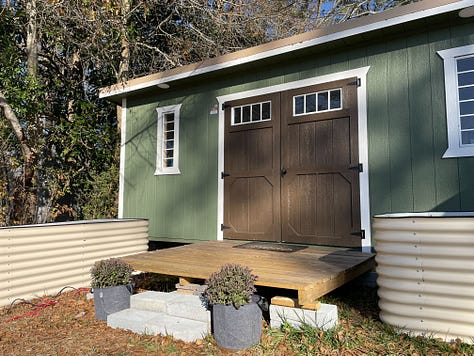
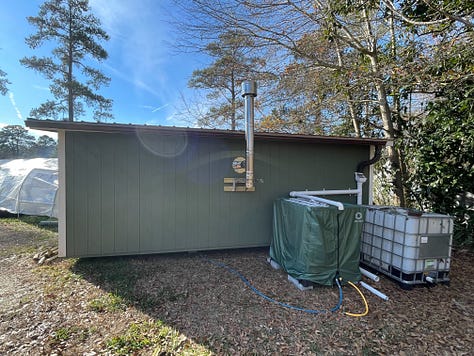

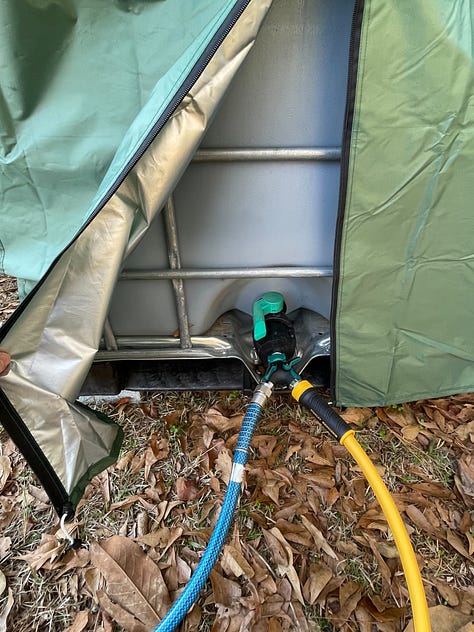
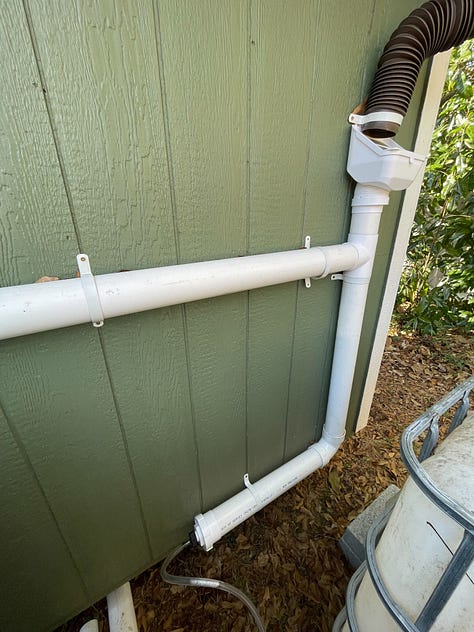
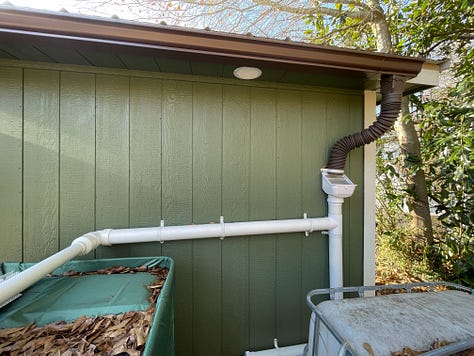
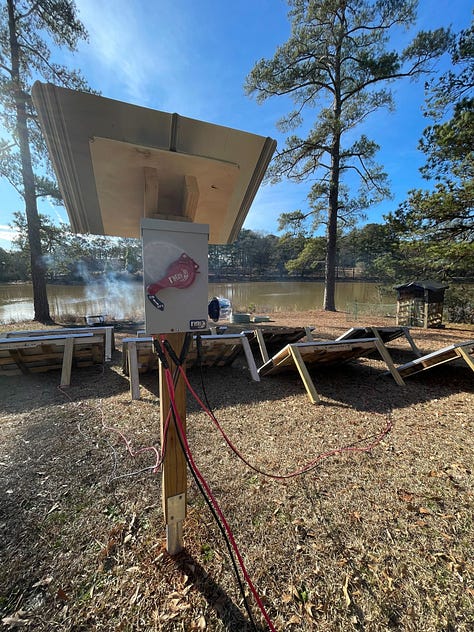
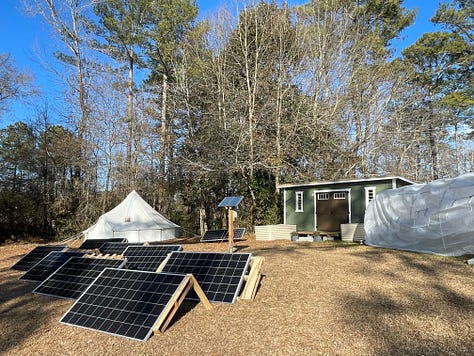
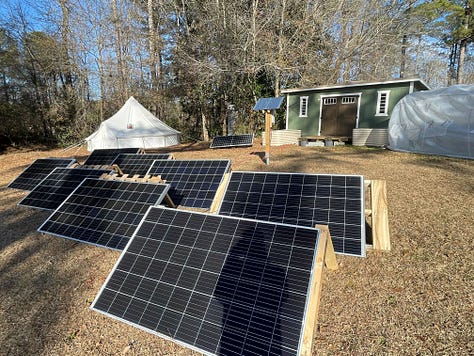
Why we did this:
We want to explore a new way to live that is a refreshing break from the debt-fueled “American Dream.” We want time spent outdoors with family, more time working with our hands to grow things, and more memories made working on meaningful projects with family.
We don’t want more social media, more fast food, more artificial media / entertainment (Disney, Netflix), more excessive taxes (suburban tax base), or more late nights at the office (corporate hustle culture).
We are seeking “enough”. Enough shelter, water, food, energy, sanitation, and transportation. These are the key physiological items we require as humans. These needs are why we work our jobs, pay for our cars, and live in (often) expensive homes near our work. Surely there is more to life than fueling the GDP for Wall Street.
What if we have things backwards? What if we focus less on chasing the money, and more on meeting our needs directly through ecological systems and practices? Money should just be the tool to buy these needs: food, water, shelter, energy, sanitation, transportation. But what if we focused on building systems to reduce the need for money? We won’t ever eliminate the need for money, but if we can reduce the need, that’s a huge win… Our modern world is hyper-financialized, and it’s not healthy.
Enter the “Acorn Home” concept…
Below is a flowchart showing how all these key off-grid systems work together in our “Off-Grid Acorn Home” concept that we followed for our off-grid build project:
The key off-grid systems we’re using:
The 5 basic needs we are working to meet at varying levels are: Shelter, energy, water, food, and sanitation. We roll transportation up under energy.
For the shelter shell we opted to use a 200 square ft pre-built shed shell from Derksen Portable Buildings. You could easily make your own cabin from 2x4s, 2x6s, tin roofing, plywood, and 4x6” skids. We could have also used a canvas tent, yurt, A-frame, RV, camper, or even a mobile home for an affordable shelter shell. An Earthship or WOFATI would make great options for a non-portable structure.
We’re using a solar panel kit from Continuous Resources to provide our electrical needs. This kit includes photovoltaic panels, charge controller, batteries, inverter, and other accessories to collect 2800W of max power on a sunny day. We’re able to charge power tools, run a small window AC unit, fans, power lights, cell phones, laptops, etc. Huge thanks to the Continuous Resources team for the amazing support and help!
We’re heating the micro cabin using a Dwarf tiny wood stove from Tiny Wood Stoves. The stove we are using is able to efficiently heat our 200 square foot area easily.
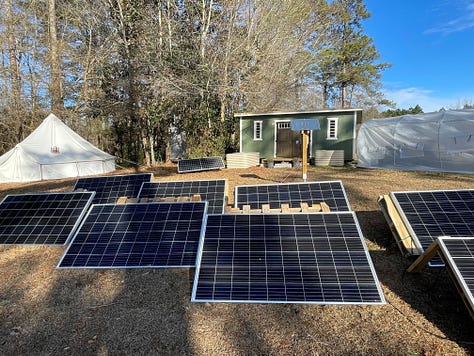
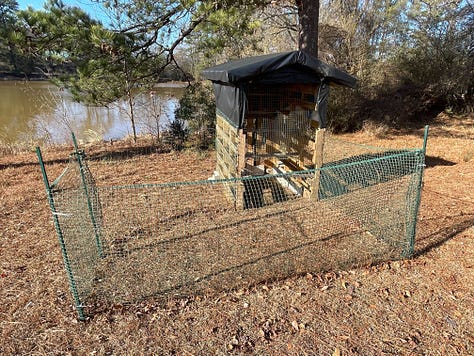
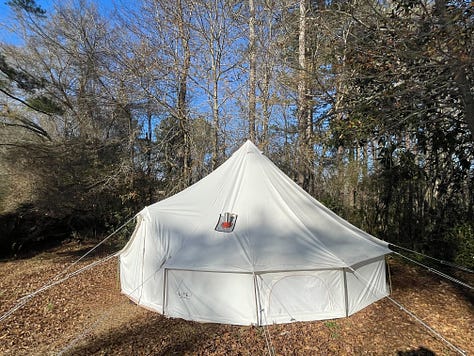

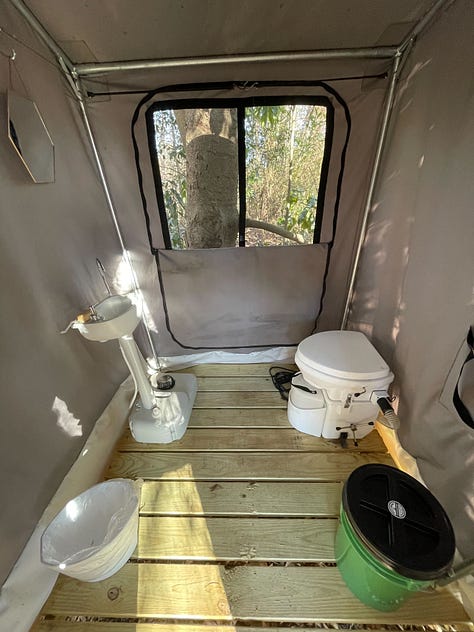
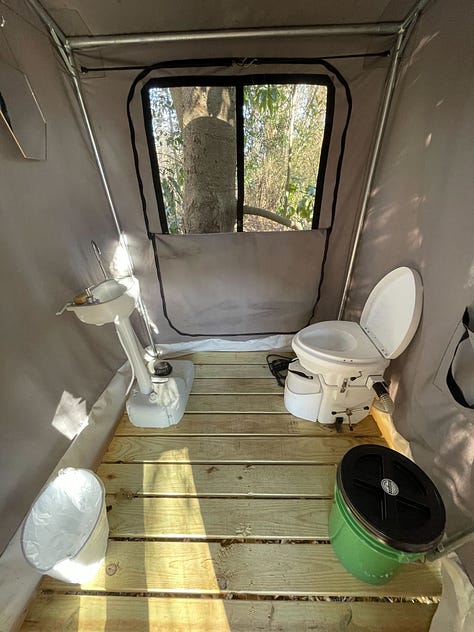
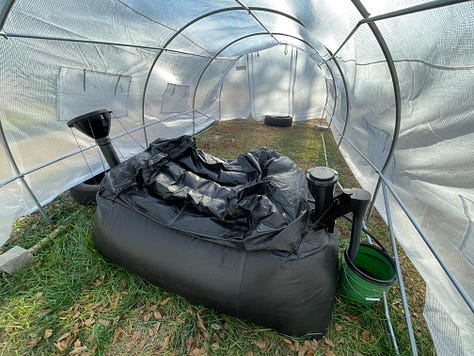
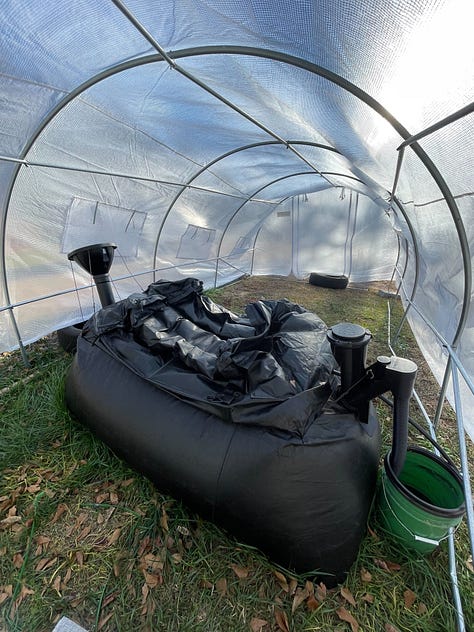
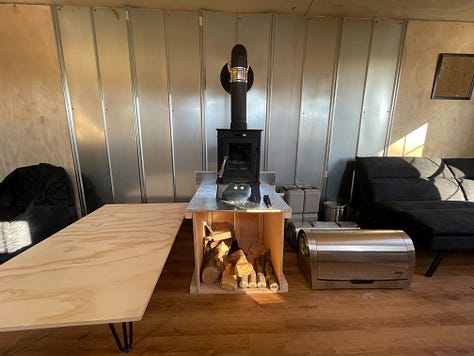
We’re using GoSun solar ovens for cooking food. These can utilize sunlight directly, or even plug into a 12V power source to cook food at night or on shady days. We also have a 12V GoSun Cooler for keeping food refrigerated or frozen.
We’re using a simple rainwater catchment system that collects rainwater from the tin roof using a gutter, and then a first flush diverter from Blue Mountain Co. We have future plans to also drill a well for a more regular supply of water (we’ll power the well with a generator to fill the cisterns). Our rainwater systems uses food-grade 275 gallon IBC tanks to store water. We use a 12V RV pump to pressurize the water through food-grade hoses. We can then purify the water using a WaterDrop purifier.
We have a HomeBioGas 2 unit to producing liquid fertilizer and 2 hours of daily cooking gas for a grill-top burner. This HomeBioGas unit is a methane digester that intakes food waste / manure into it’s water-holding-tank, and then produces methane biogas and liquid fertilizer. HomeBioGas even provides a toilet that can connect to the unit, in addition to a hot water heater that can be powered from the methane biogas. We use a small greenhouse to keep the HomeBioGas unit warm in the winter for optimal performance. It needs an avg temp of 68*F to produce gas properly.
We’re using a canvas outhouse on a small wooden deck for a bathhouse, with a Nature’s Head Composting toilet, and a foot-pump sink. This gives us a simple and affordable bathroom.
As a guest house, we have a canvas Life-in-tents tent, a blow up mattress, a 400W solar panel, and a Delta EcoFlow solar generator.
We use Birdies raised beds from Epic Gardening for growing veggies from compost in our permaculture gardens. We use seed trays, Botanical Interest seeds, and many other tools from Epic Gardening as well. They were a huge supporter of this project and we’re incredibly thankful for their encouragement and support! Thank you Kevin & Team! We also built a $50 chicken coop for giving a few of our hens a home to lay eggs at the micro-cabin location!
We also tested out Aventon Aventure e-bikes as a lightweight form of micro EV transportation that can easily be charged by our solar panel system. They can cruise at up to 30 MPH and have a 30-60 mile range. They work very well to get around locally! If only we had more bike paths locally, these would be an incredible way to get around here in the US! Checkout our video about the e-bikes here!
Using all of these systems together, we’re able to provide for the basic needs of: water, energy, shelter, sanitation, transportation & food. Utility bills don’t exist, a mortgage doesn’t exist, and property taxes / insurance / maintenance would be very low.
If you financed these systems for 5-10 years, OR paid cash, you could have a lifestyle that only requires a little cash for health insurance, the food you don’t grow, and transportation needs outside of an e-bike. You could live a very high-quality life with a $50k salary, be debt free, and work part time. You could reclaim freedom.
The order of installation for us:
🍁 Off-Grid in 30 Days - Building an off-grid home for less than $25k
🏕️ Episode 1: Canvas Tent, Clearing Brush, & Ordering the Cabin Shell
💧 Episode 2: PV Panels, Water Pump, IBC Totes, Composting Toilet, Biogas Digester
🪴 Episode 3: Green House, Raised Beds, Seed Cells, Cabin Arrival
🏡 Episode 4: The 200 square ft Micro Cabin shell tour - inside and out!
🐓 Episode 5: Building a Chicken Coop for $50!
🏕️ Episode 6: Finishing the inside of the canvas bell tent
🐑 Episode 7: Insulating the cabin with Havelock Sheep's Wool
📐 Episode 8: Installing LVP flooring inside the cabin
🌧 Episode 9: Rainwater Catchment System + FirstFlush Diverter & Water Tank
🪵 Episode 10: Installing Plywood siding inside the cabin
🔥 Episode 11: Installing the Dwarf Wood Stove from Tiny Wood Stoves
🌿 Episode 12: Filling & Fertilizing Our Birdies Raised Gardening Beds
☀️ Episode 13: Installing a 2800W Solar Panel System with Batteries
🪑 Episode 14: Furnishing the Micro Cabin + Full compilation of the off-grid build!
Sharing these ideas far and wide:
We’ve worked hard to document & record as much of the information we’ve learned as possible. We WANT there to be a quiet & peaceful revolution of people changing local zoning laws, building tiny homes, planting gardens, going off-grid and reclaiming local autonomy through sustainable systems and slow lifestyles. It’s time to reject the broken American Dream of debt bondage in favor of a new dream of simple living, slow lifestyles, sustainable systems, and enjoying “enough.”
We’re actively working to convert Acorn Land Labs into a non-profit for 2024 and beyond. We’ve never made much money from this endeavor, but that’s not the goal. Spreading ideas for a different way of living is the goal. We do have hosting, domain, server, and other digital expenses to keep all of this running. All the proceeds from our book, ebook, course, audiobook, and community access sales go to help support our continued work on researching and sharing off-grid, sustainable living ideas.
We’ve marked all our learning materials down to the lowest we possible can sell them for for 2024. You can learn about ALL these systems for free reading our blog posts and videos. We want these ideas to be available with deeper info through printed books and video courses! Here’s the 2024 pricing if you want to dive deeper:
Purchase our Acorn Bundle: $49
The 10 Hour Off-Grid Video Course
Lifetime Acorn Off-Grid Community Access
Lifetime Off-Grid Simulator Access
eBook PDF Download
Acorn Off-Grid Audiobook
+ Lifetime Off-Grid Community Access
+ Lifetime Off-Grid Simulator Access
Thank you for ALL the support and encouragement this year. We hope your 2024 is fantastic! Go grow something or build something and enjoy the blessing of today!
Sincerely, Kemble & the Acorn Team
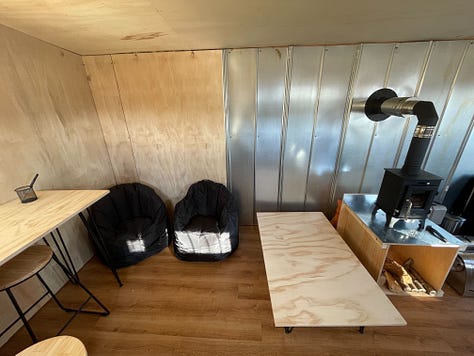
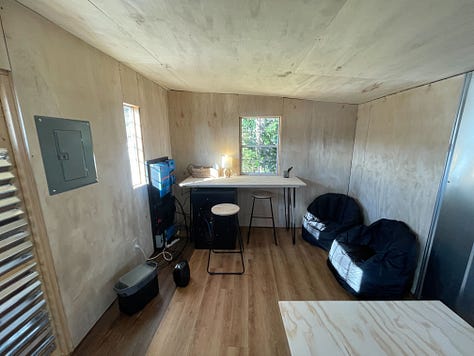
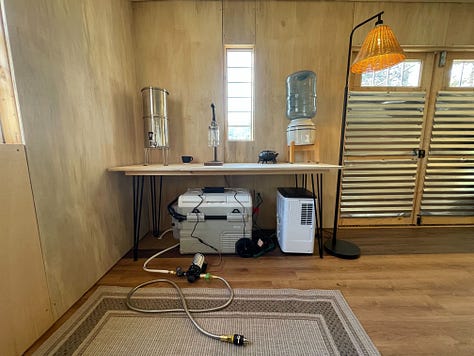
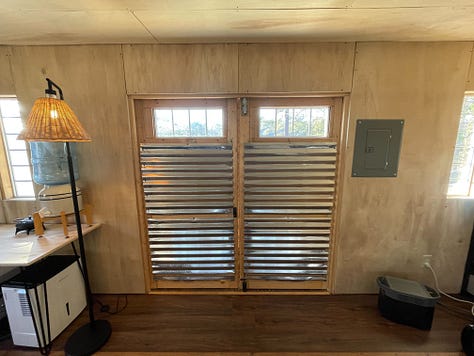
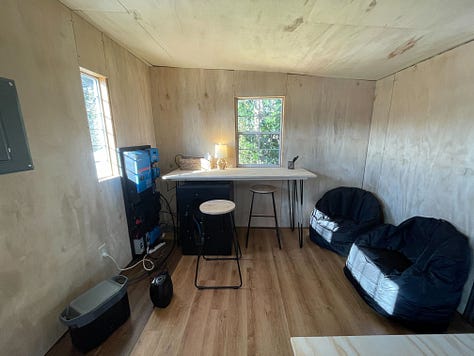
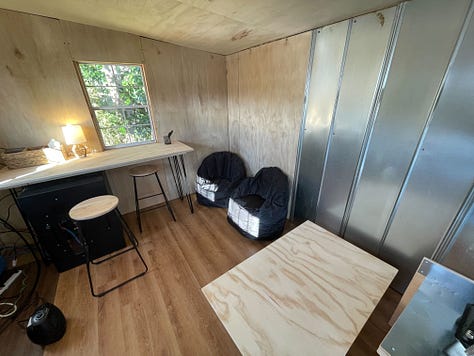
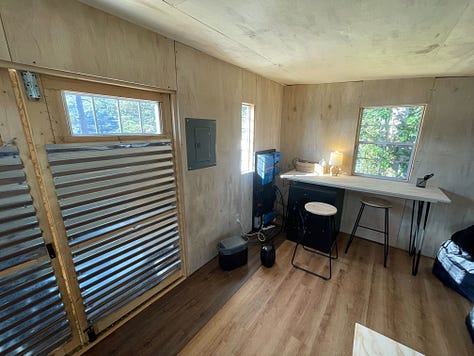
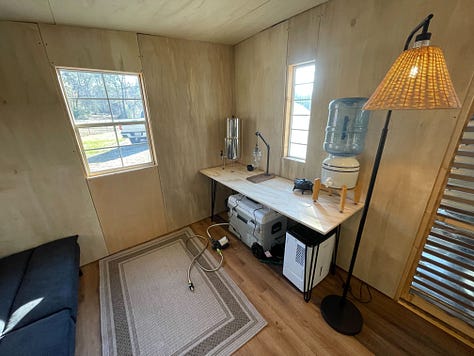
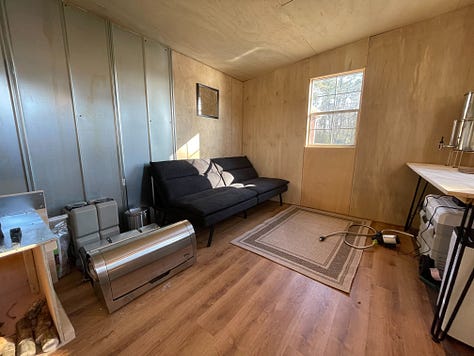



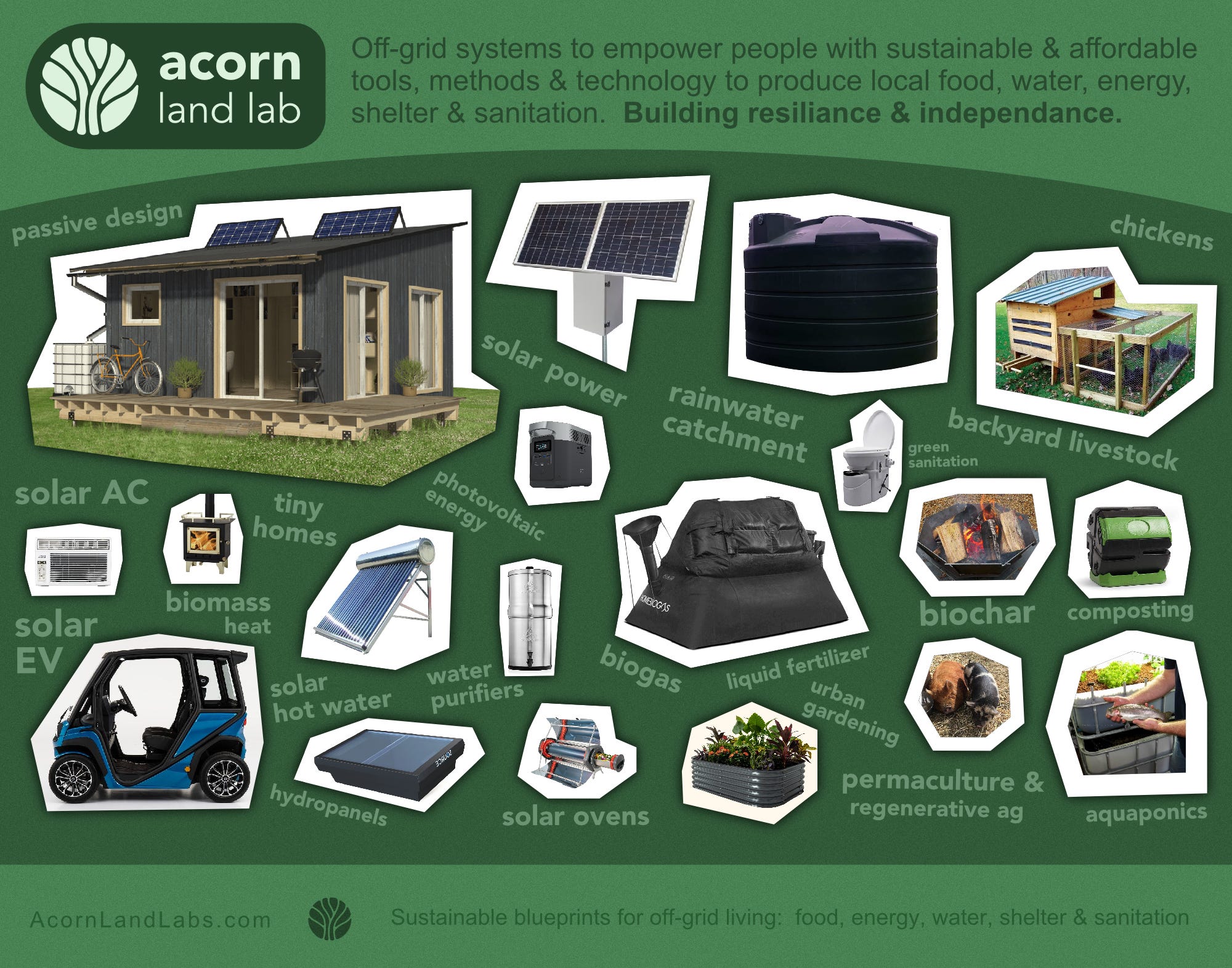
Great work. I would like to suggest you consider the DC microgrids from Living Energy Farm:
https://livingenergyfarm.org/
They have some really interesting implementations on the energy part, reducing the battery,inverters part and using decades-withstanding nickel iron batteries
Impressive! Thanks for sharing this important information about a very worthwhile housing project.